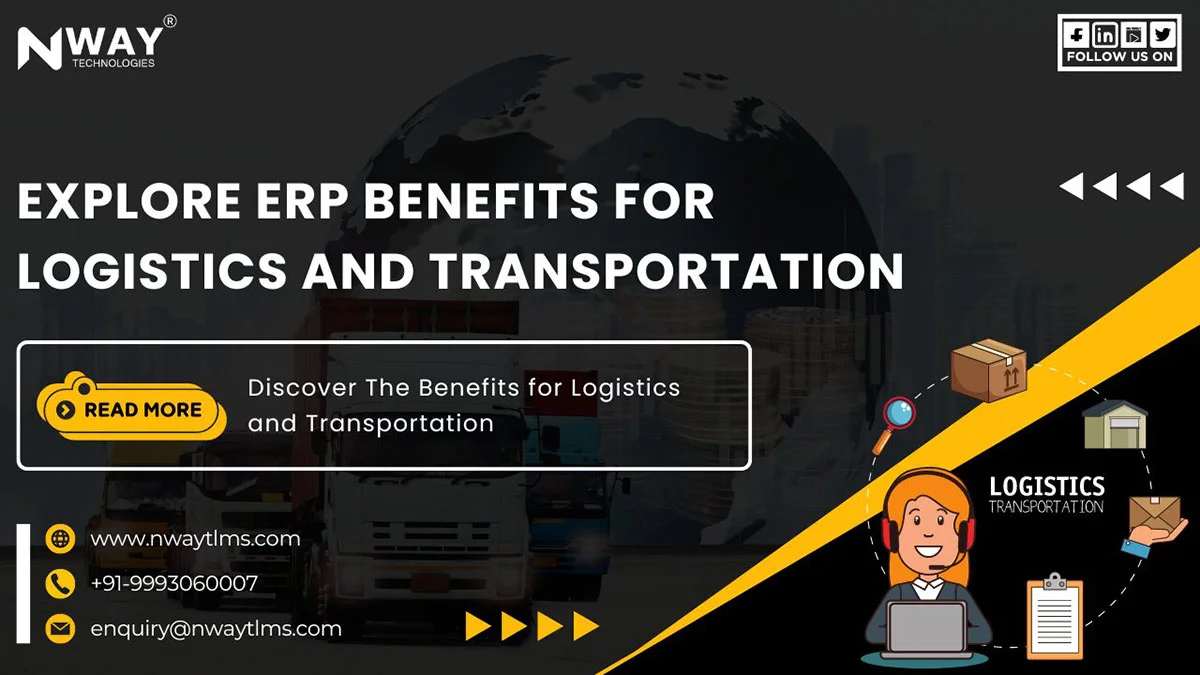Explore ERP Benefits for Logistics and Transportation

Precision and efficiency are paramount in the dynamic world of transportation and logistics. Imagine a complex network of processes that are interconnected, from the production floor up to the delivery point, and all seamlessly orchestrated to satisfy the needs of modern commerce. The logistics and transport industry is at the center of this complex web, which plays a crucial role in global economics.
A Brief Overview of Logistics and Transportation Industry
Logistics and Transportation is the foundation of modern commerce. It facilitates the flow of materials and goods from the producers to the consumers around the world. This multifaceted industry encompasses many activities from warehousing, distribution, freight forwarding, and even last-mile deliveries. Each of these plays a crucial role in the smooth movement of goods throughout supply chains.
Success in this high-speed environment depends on your ability to manage complex logistical issues, allocate resources efficiently, and get products delivered to the right destination with precision and speed. Logistics companies are constantly under pressure to adapt and innovate to keep up with changing customer demands.
Enterprise Resource Planning Systems (ERPs)
Enterprise Resource Planning systems are powerful software tools that streamline processes, improve operational efficiency and boost business performance. ERP systems are centralized hubs which integrate different departments and functions within an organization, such as finance, human resources, procurement, and inventory management.
ERP systems are crucial in the logistics and transport industry. They optimize operations through real-time visibility of supply chain activity, automation and seamless collaboration between stakeholders. ERP software consolidates data from multiple sources, provides actionable insights and enables organizations to take informed decisions. It also improves productivity and delivers superior customer service.
ERP Solutions for the Logistics and Transportation Industry Offers Many Benefits
1. Enhancing Operational Efficiency
Logistics and transportation success is based on efficiency. ERP systems combine multiple business processes onto a single platform. This eliminates silos, and promotes seamless communication between departments. ERP software automates routine tasks and reduces manual errors. It can also be used to optimize routes and maintain vehicles. Centralizing data and standardizing processes allows organizations to reduce redundancy, maximize resource usage, and improve overall operational efficiency.
2. Real-time Visibility and Tracking
ERP systems are a must-have for industries where transparency is king. They provide real time insights on every facet of the supply chains. Companies can monitor and track inventory, identify bottlenecks and delays, and track shipments using advanced tracking features. The ability to get up-to-date information at any given time and from anywhere gives stakeholders greater control of their business. They can make better decisions, respond quickly to market changes or customers’ demands, all while being able to keep track of shipments.
3. Uninterrupted Collaboration and Communication
Logistics and transport networks need to work together effectively for a smooth operation. ERP systems facilitate communication and collaboration between internal teams and external partners and customers. ERP systems provide a central platform for sharing data and communicating with stakeholders. This allows them to work together in real-time, exchange documents and better coordinate their activities. ERP software facilitates collaboration, allowing for greater alignment throughout the supply chain.
4. Customers Service: Improved
Delivering exceptional customer service in today’s highly competitive market is crucial for maintaining customers and increasing your competitive advantage. ERP systems are essential in improving the customer’s experience, as they provide timely and accurate data at each touchpoint. Companies can empower and inform customers throughout the fulfillment process with features like order tracking, notification of delivery, and self service portals. Delivering on time, minimizing errors and responding to customer questions promptly can help organizations build loyalty and trust with their clients.
5. Data-driven Decision Making
To stay ahead in the age of big data and data analytics, it is important to harness the power of this technology. ERP systems analyze and collect vast quantities of data, allowing valuable insight into market trends and customer behavior. By using advanced reporting and analytics tools, businesses can uncover opportunities and identify patterns. They can also optimize strategies to increase efficiency and profit. ERP software allows organizations to take data-driven business decisions, whether it is predicting demand, optimizing routes or identifying potential cost savings.
6. Risk Management and Regulatory Compliance
Logistics and transportation firms face a complex regulatory landscape and managing risk. ERP systems can help companies stay in compliance with regulations, mitigate risk, and adhere to security and safety protocols by maintaining accurate records and following standard operating procedures. ERP software comes with built-in audit trails and compliance features that help companies demonstrate compliance and minimize liabilities.
NWAY TLMS: Your Partner for Success
We at NWAY TLMS, we understand the particular problems and opportunities that face transport companies in the present. We aim to help companies with cutting-edge ERP solutions that promote productivity, growth and satisfaction of customers. When you have NWAY TLMS as a trusted advisor, you’ll be able to deal with the complexity of transportation ERP deployment with confidence, and meet your goals for business. Make NWAY TLMS your path to success in the ever-changing field of logistics and transportation.
Read More : How Does Logistic Management ERP Software Help Businesses?
Conclusion
Enterprise Resource Planning systems (ERPs) offer many benefits for the transportation and logistics industry. These include enhanced operational efficiency, real-time transparency, improved customer service, and data-driven decisions. ERP software allows companies to streamline operations, maximize resources and achieve sustainable growth.
In a world where technology is constantly evolving and expectations of customers are changing, ERP will continue to be a vital tool for optimizing efficiency, profitability, and performance in the transportation and logistics sector.